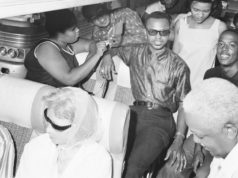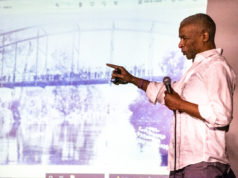
(Editor’s note: This is the second in a series of film reviews and cultural observations from 2017’s South by Southwest festival.)
AUSTIN — The notion that to be political is to be a black person was elegantly put forth by Justin Simien in the sneak peek of his Netflix series Dear White People, which screened March 13 at South by Southwest and is based on the Independent Spirit Award-winning film.
The series, which won an Audience Award for Episodics, focuses on one catalyzing event: Pastiche, a humor magazine at the fictional Winchester University, throws a blackface party on campus. Posters advertising the bash promise party goers liberation and a chance to get away from “political correctness.” The question of political correctness, the argument about it, sometimes coded, not long ago expressed its intense relevancy on Oklahoma’s state school campus.
The first episodes are broken into individual stories of different characters and their experiences leading up to the event, which is crashed by activist black students. The political and personal question for them is what they will do about the party’s existence.
From double to triple consciousness
Logan Browning plays (with range and delicacy) Samantha White, the African American host of an underground campus radio show called Dear White People. Its stated purpose is to “articulate the feelings of a misrepresented group outside the majority.”
Her performance on the radio show, a linchpin to the film that inspired this series, has flavor, confidence and intellectual combativeness. The reveal is White’s fling with a white student named Gabe (John Patrick Amedori).
She tells her skeptical friend Joelle of the conflict. Samantha can be silly around Gabe. It’s an escape. Later, the party is going to ask if she’s going to assume a more political being. The pressure to define herself happens sooner than she would like when Gabe posts a picture to Instagram of her leaving his bed captioned “Hate it when #Bae leaves.” Her friends pass the image around while still in front of her. Gabe’s a nice guy, but the resulting tension alludes to a general entitlement, a white appropriation of black culture (his freedom to take the #Bae pic and post).
Logan’s role has more layers than the effortless performance leads on. WEB DuBois wrote of a double consciousness in the souls of black folk. Logan seems to have a triple consciousness: Logan in interracial love, Logan among the black student community and Logan as a political leader, voice of a pointed radio show — to say nothing of her presence on Instagram and Twitter.
Series coming to Netflix on April 28
Dear White People has a vibe of both a ’90s sitcom and an ambitious indie film. When Simien introduces the characters of the salon, for example, he employs a high style: distinctly composed blocking, interesting close-ups and elegant music, a careful staging that recalls Spike Lee’s School Daze.
Simien told the crowd that he also drew inspiration from screenplays that were “writ-ten” — like Paddy Chayefsky’s Network. His decision to use the Netflix sequence as a Robert Altman-esque vehicle for character mosaic is evidenced in each episode, told from a different collegiate’s perspective.
Elsewhere, the cast and crew hinted at a mid-season emotional game changer directed by Barry Jenkins, fresh off his Oscar win for Moonlight.
Dear White People is set to be available on Netflix April 28.




















